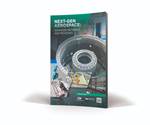Teijin supplies CFRTP for A350 XWB primary structural parts
The Airbus airliner incorporating Teijin’s Tenax TPCL carbon fiber thermoplastic consolidated laminate was delivered to Japan Airlines.
Teijin Ltd. (Tokyo, Japan) has announced that its Tenax TPCL carbon fiber thermoplastic consolidated laminate was incorporated into the A350 XWB, Airbus’s new extra-wide-body midsize jetliner delivered to Japan Airlines (JAL; Tokyo) on June 14. Tenax TPCL was used in the joints connecting the skin, frame and stringer components of the aircraft’s fuselage, according to Teijin.
The company has provided Airbus with Tenax carbon fiber for several of its aircraft families over the past 30 years. In May 2014, Tenax TPCL was registered in Airbus’s qualified products list for the world’s first use of carbon fiber-reinforced thermoplastic (CFRTP) in primary structure parts for Airbus’s aircraft. Tenax TPCL, which uses carbon fiber composites made with high impact-, heat- and chemical-resistant polyetheretherketone (PEEK) thermoplastic resin, is supplied by Teijin Carbon Europe GmbH (Wuppertal, Germany).
Teijin says it is increasingly emphasizing strong, lightweight, high-performance materials that offer environmentally sensitive solutions for improved fuel efficiency. Teijin is focusing its carbon fiber business on the aircraft field, where it is rapidly developing midstream and downstream applications. Going forward, Teijin intends to further strengthen its carbon fiber and its intermediate material business as a leading solution provider for aircraft applications.
Related Content
-
Plant tour: Albany Engineered Composites, Rochester, N.H., U.S.
Efficient, high-quality, well-controlled composites manufacturing at volume is the mantra for this 3D weaving specialist.
-
Cryo-compressed hydrogen, the best solution for storage and refueling stations?
Cryomotive’s CRYOGAS solution claims the highest storage density, lowest refueling cost and widest operating range without H2 losses while using one-fifth the carbon fiber required in compressed gas tanks.
-
Plant tour: Joby Aviation, Marina, Calif., U.S.
As the advanced air mobility market begins to take shape, market leader Joby Aviation works to industrialize composites manufacturing for its first-generation, composites-intensive, all-electric air taxi.

.jpg;width=70;height=70;mode=crop)











